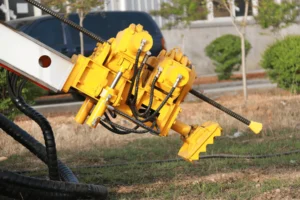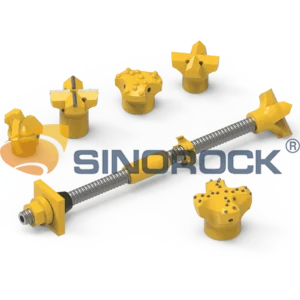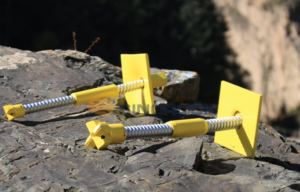Introduction
The self-drilling hollow rock bolt has become a cornerstone in geotechnical engineering, particularly in the construction of tunnels, foundations, and slope stabilization projects. This innovative technology offers significant advantages over traditional anchoring methods, including superior load-bearing capacity, ease of installation, and enhanced adaptability to various ground conditions. One of the most critical factors contributing to its widespread adoption is its reaming capability. This article explores the principles behind the reaming effect, its applications, and the reasons why self-drilling hollow rock bolts are increasingly replacing conventional anchoring systems.
Understanding the Reaming Effect in Self-Drilling Hollow Rock Bolts
The reaming capability of self-drilling hollow rock bolts is a distinctive feature that sets them apart from other anchoring systems. Reaming refers to the process by which the borehole diameter is increased beyond the size of the original drill bit, resulting in a larger encapsulation of cement grout around the bolt. This enlarged grout body provides enhanced anchoring strength and stability, making the system particularly effective in challenging ground conditions.
How the Reaming Process Works
The reaming effect is primarily achieved through the simultaneous drilling and grouting process unique to self-drilling hollow rock bolts. Unlike traditional anchors, which require pre-drilling and subsequent insertion of the anchor, self-drilling bolts combine these steps into a single operation. The process begins with the drill bit penetrating the ground, creating an initial borehole. As drilling progresses, cement grout is pumped through the hollow core of the bolt and expelled from grout outlets near the drill bit.
The pressurized grout not only fills the borehole but also interacts with the surrounding soil or rock. In loose or fractured formations, the movement and pressure of the grout cause the borehole walls to loosen further, resulting in the displacement of soil or rock fragments. This displacement exposes a more stable and irregular borehole wall, which, when filled with grout and solidified, forms a larger and irregularly shaped anchoring body.

The Science Behind the Reaming Effect
Research and professional studies have demonstrated that the actual borehole diameter achieved through this process can be significantly larger than the original drill bit size. In typical conditions, the borehole diameter is at least 20mm larger than the drill bit. In softer soils, such as sand or gravel, the diameter increase can be as much as 50 to 70mm. This enlarged diameter not only increases the volume of grout but also enhances the mechanical interlock between the grout and the surrounding ground, resulting in a denser and more robust anchoring system.
Applications of Self-Drilling Hollow Rock Bolts with Reaming Capability
The reaming effect of self-drilling hollow rock bolts is particularly advantageous in applications where ground conditions are variable or unstable. These include soil nailing, micropiling, slope stabilization, and tunneling projects. The ability to create a larger and more irregular anchoring body improves the overall stability and load-bearing capacity of the structure.
Soil Nailing
Soil nailing is a technique used to reinforce and stabilize slopes, excavation sites, and retaining walls. Traditional soil nailing methods often involve the use of steel bars inserted into pre-drilled holes. However, this approach can be challenging in loose or collapsing soils, where borehole integrity is difficult to maintain. Self-drilling hollow rock bolts, with their reaming capability, offer a more reliable alternative. The simultaneous drilling and grouting process ensures that the borehole remains open and stable, while the enlarged grout body provides superior anchoring performance.
Micropiling
Micropiles are small-diameter, deep foundation elements used to transfer loads to more stable soil or rock layers. The reaming effect of self-drilling hollow rock bolts enhances the load transfer capacity of micropiles by increasing the surface area of the grout body in contact with the surrounding ground. This increased contact area results in higher frictional resistance and improved load-bearing capacity, making self-drilling hollow rock bolts an ideal choice for micropiling applications.
Slope Stabilization
In slope stabilization projects, the stability of the anchored structure is crucial. Self-drilling hollow rock bolts, with their ability to create larger and more irregular grout bodies, provide enhanced resistance to sliding and overturning forces. The reaming effect ensures that the anchoring body is securely embedded in the ground, even in challenging conditions such as loose or fractured rock formations.
Tunneling
Tunneling projects often encounter variable ground conditions, ranging from soft soils to hard rock. The adaptability of self-drilling hollow rock bolts makes them well-suited for these environments. The reaming capability allows for the creation of a larger grout body, which provides better support to the tunnel walls and reduces the risk of collapse or deformation. Additionally, the simultaneous drilling and grouting process reduces the time and labor required for installation, making self-drilling hollow rock bolts a cost-effective solution for tunneling projects.
Advantages of Self-Drilling Hollow Rock Bolts Over Conventional Anchors
The reaming capability of self-drilling hollow rock bolts offers several advantages over conventional anchoring systems, such as steel bar anchors. These advantages include improved anchoring performance, ease of installation, adaptability to various ground conditions, and cost-effectiveness.
Improved Anchoring Performance
As discussed earlier, the reaming effect results in a larger and more irregular grout body, which provides superior mechanical interlock and load transfer. This enhanced anchoring performance is particularly beneficial in challenging ground conditions, where traditional anchors may struggle to provide adequate support.
Ease of Installation
The simultaneous drilling and grouting process simplifies the installation of self-drilling hollow rock bolts. This one-step process reduces the need for additional equipment and labor, leading to faster installation times and lower overall project costs. Additionally, the ability to drill and grout in a single operation reduces the risk of borehole collapse or deformation, which can be a common issue with conventional anchors.
Adaptability to Various Ground Conditions
Self-drilling hollow rock bolts are highly adaptable to a wide range of ground conditions, from soft soils to hard rock. The reaming capability allows for the creation of a stable and secure anchoring body in even the most challenging environments. This adaptability makes self-drilling hollow rock bolts a versatile solution for a variety of geotechnical applications.
Cost-Effectiveness
The combination of improved anchoring performance, ease of installation, and adaptability to various ground conditions makes self-drilling hollow rock bolts a cost-effective solution for many projects. By reducing the need for additional equipment, labor, and materials, self-drilling hollow rock bolts can help to lower overall project costs while providing superior performance.
Conclusion
The reaming capability of self-drilling hollow rock bolts is a game-changer in the field of geotechnical engineering. By enabling the creation of larger and more irregular grout bodies, these bolts provide superior anchoring performance, particularly in challenging ground conditions. Their ease of installation, adaptability, and cost-effectiveness make them an ideal choice for a wide range of applications, from soil nailing and micropiling to slope stabilization and tunneling.





